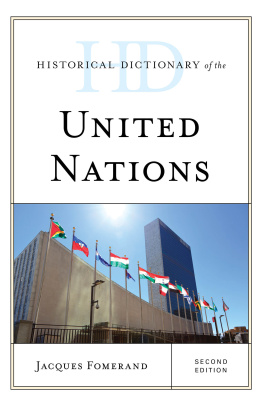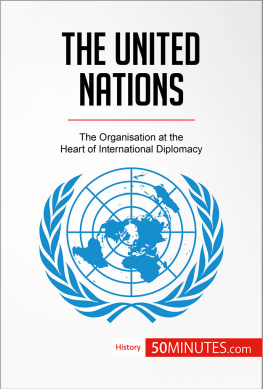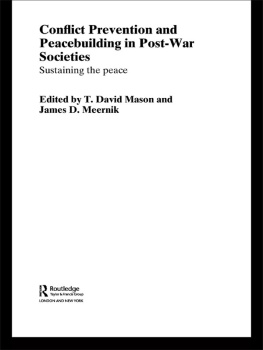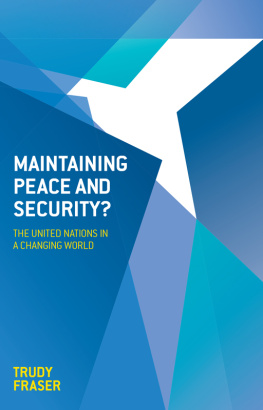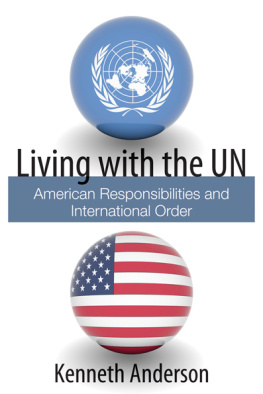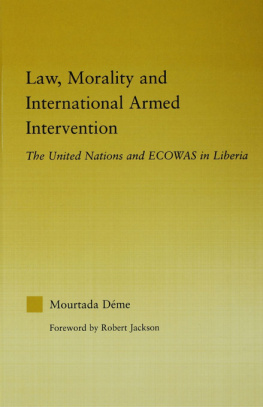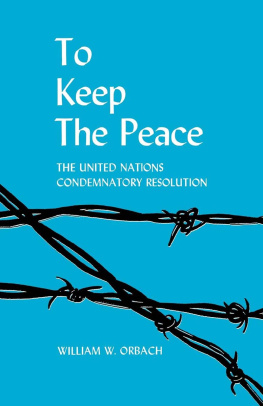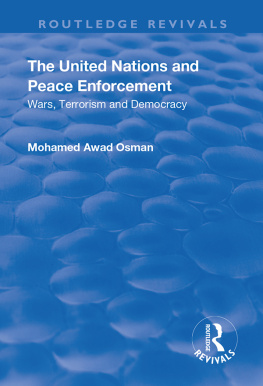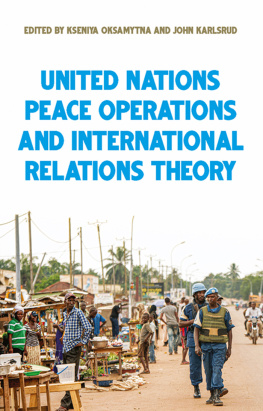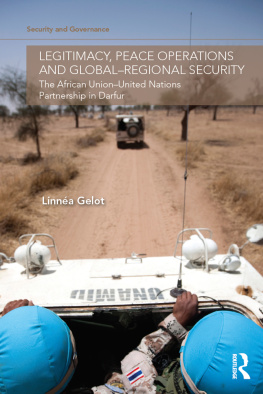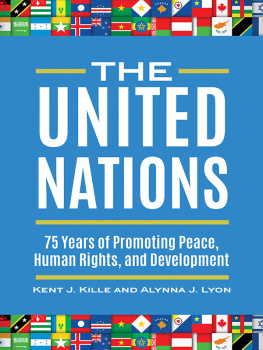Forsythe David P. - The United Nations and Changing World Politics
Here you can read online Forsythe David P. - The United Nations and Changing World Politics full text of the book (entire story) in english for free. Download pdf and epub, get meaning, cover and reviews about this ebook. City: Boulder;Colo, year: 2014, publisher: Westview Press, genre: Politics. Description of the work, (preface) as well as reviews are available. Best literature library LitArk.com created for fans of good reading and offers a wide selection of genres:
Romance novel
Science fiction
Adventure
Detective
Science
History
Home and family
Prose
Art
Politics
Computer
Non-fiction
Religion
Business
Children
Humor
Choose a favorite category and find really read worthwhile books. Enjoy immersion in the world of imagination, feel the emotions of the characters or learn something new for yourself, make an fascinating discovery.

- Book:The United Nations and Changing World Politics
- Author:
- Publisher:Westview Press
- Genre:
- Year:2014
- City:Boulder;Colo
- Rating:5 / 5
- Favourites:Add to favourites
- Your mark:
- 100
- 1
- 2
- 3
- 4
- 5
The United Nations and Changing World Politics: summary, description and annotation
We offer to read an annotation, description, summary or preface (depends on what the author of the book "The United Nations and Changing World Politics" wrote himself). If you haven't found the necessary information about the book — write in the comments, we will try to find it.
The United Nations and Changing World Politics — read online for free the complete book (whole text) full work
Below is the text of the book, divided by pages. System saving the place of the last page read, allows you to conveniently read the book "The United Nations and Changing World Politics" online for free, without having to search again every time where you left off. Put a bookmark, and you can go to the page where you finished reading at any time.
Font size:
Interval:
Bookmark:
The
United Nations
and Changing
World Politics
SEVENTH EDITION

THE
UNITED NATIONS
and CHANGING
WORLD POLITICS

THOMAS G. WEISS
The CUNY Graduate Center
DAVID P. FORSYTHE
University of Nebraska
ROGER A. COATE
Georgia College
KELLY-KATE PEASE
Webster University

A Member of the Perseus Books Group
Westview Press was founded in 1975 in Boulder, Colorado, by notable publisher and intellectual Fred Praeger. Westview Press continues to publish scholarly titles and high-quality undergraduate- and graduate-level textbooks in core social science disciplines. With books developed, written, and edited with the needs of serious nonfiction readers, professors, and students in mind, Westview Press honors its long history of publishing books that matter.
Copyright 2014 by Westview Press
Published by Westview Press,
A Member of the Perseus Books Group
All rights reserved. No part of this book may be reproduced in any manner whatsoever without written permission except in the case of brief quotations embodied in critical articles and reviews. For information, address Westview Press, 2465 Central Avenue, Boulder, CO 80301. Find us on the World Wide Web at www.westviewpress.com.
Every effort has been made to secure required permissions for all text, images, maps, and other art reprinted in this volume.
Westview Press books are available at special discounts for bulk purchases in the United States by corporations, institutions, and other organizations. For more information, please contact the Special Markets Department at the Perseus Books Group, 2300 Chestnut Street, Suite 200, Philadelphia, PA 19103, or call (800) 810-4145, ext. 5000, or e-mail .
Set in 10.25 Minion Pro by the Perseus Books Group
Library of Congress Cataloging-in-Publication Data
Weiss, Thomas George.
The United Nations and changing world politics / Thomas G. Weiss, David P. Forsythe, Roger A. Coate, Kelly-Kate Pease.Seventh edition
pages cm
Includes bibliographical references and index.
ISBN 978-0-8133-4848-3 (e-book) 1. United Nations. 2. World politics1989 I. Forsythe, David P., 1941 II. Coate, Roger A. III. Pease, Kelly-Kate. IV. Title.
JZ4984.5.W45 2014
341.23'1dc23
2013005320
10 9 8 7 6 5 4 3 2 1
Contents
Tables
Figures
Photographs
The United Nations and Changing World Politics explores the role of the UN and its associated family of organizations and specialized agencies in contemporary global governance. The UN is seemingly always in transition, which is central to understanding world politics and also why this book is in its seventh edition. The three substantive sections of this textinternational peace and security, human rights and humanitarian affairs, and sustainable human developmentcontinue to be at the center of our own approaches to international organization and law. How the UN, with its 193 member states, responds to the related challenges, both old and new, is the substance of this book.
The United Nations has many shortcomings that involve politics entrenched in state rivalries between the haves and have-nots, competing power centers, and bureaucratic infighting to control agendas and resources. We have endeavored to capture the UNs essence as a political organization caught in the struggle to make public policy through the exercise of power. We stress how representatives of member states and other actors, such as international civil servants and nongovernmental organizations, seek to use UN symbols and procedures to shape policy. Policymaking always involves power, understood as a synonym for influence. We also observe how UN structures and processes constrain the exercise of power. Hard power involves coercion through manipulation of economic resources and military force. Soft power involves persuasion and pressure through words and symbolic acts. The central question, for those interested in the United Nations, is who seeks what policy objective, using what power, and with what outcome? What occurs at the UN, to paraphrase Harold Lasswells classic 1936 formulation of politics, is about Who Gets What, When, How.
The United Nations is about global governance without a world government, or attempts to collectively manage transnational problems in the absence of the normal attributes of government. These attributes include a true legislature, a single executive branch, an integrated court system, and, above all, a legitimate monopoly on the exercise of force. Our primary objective is to get students to understand the UN as part of the fabric of world politics and its presumed centrality in managing complicated problems involving war, reconstruction, protection and promotion of human dignity, development, and environmental protection. We construct a balance sheet of achievements and shortcomings, and we address the UNs role relative to regional organizations, unilateral undertakings, and ad hoc arrangements.
We also wanted to capture the essence of public international law as an institution that exerts real influence on real political struggles. We emphasize that, like all public law, the international version is not a technical subject independent of politics but rather part and parcel of world politics. International law is formulated through a political process, frequently revolving around a variety of UN forums. Consequently, public international law interacts with world politics, sometimes shaping it greatly and sometimes only slightly or not at all.
We also stress the importance of history. The present and the future have a history. When seemingly new issues arise, there is always a background to the issue that affects its management or disposition. When U.S. secretary of state Colin Powell spoke at the UN Security Council in early 2003 about whether Iraq had complied with previous council resolutions demanding disarmament, many commentators referred back to the council of 1962. Then, U.S. permanent representative Adlai Stevenson dramatically confronted the Soviet Union over the issue of Soviet missiles in Cuba. In 2003 the United States did not have the same kind of compelling evidencethe smoking gunof denied weapons activity presented some forty years earlier. Still, UN history was part of the drama for Powells presentation. History does not necessarily determine the futurepath dependency is an overused imagebut history often affects the future in that it provides insights and lessons and frequently circumscribes policy options and prescriptions. The history of such issues as using military force, coordinating humanitarian assistance, and promoting sustainable development affects new policy decisions. Knowing this history is essential for understanding UN politics. We want readers to learn the political and legal history of the UN so that present and future choices can be analyzed and debated against that background.
We have endeavored to design this book so that it can be used in at least two ways. First, we want it to serve as a core text in college courses on international organization and the United Nations, and we also are immodest enough to believe that many graduate students and even diplomats could learn a great deal from these pages. Second, we want it to be useful as supplemental reading in other courses, such as international relations and international law. Thus, the essentials of politics at the UN in three central arenas (security, human rights, and sustainable human development) provide the spine for this book because of their intrinsic importance in world politics and because the United Nations has had significant normative and operational impacts in all three. We have brought our collective experiences and judgment to bear on analyses of these issues. If we can get students to better understand the United Nations as a political organization affected by international law, with its own history; if we can accurately portray the UN as greatly affected by basic changes in its political milieu; and if we can provide insights about what the UN has done and how these efforts might be improved in the future, we will have succeeded.
Next pageFont size:
Interval:
Bookmark:
Similar books «The United Nations and Changing World Politics»
Look at similar books to The United Nations and Changing World Politics. We have selected literature similar in name and meaning in the hope of providing readers with more options to find new, interesting, not yet read works.
Discussion, reviews of the book The United Nations and Changing World Politics and just readers' own opinions. Leave your comments, write what you think about the work, its meaning or the main characters. Specify what exactly you liked and what you didn't like, and why you think so.

